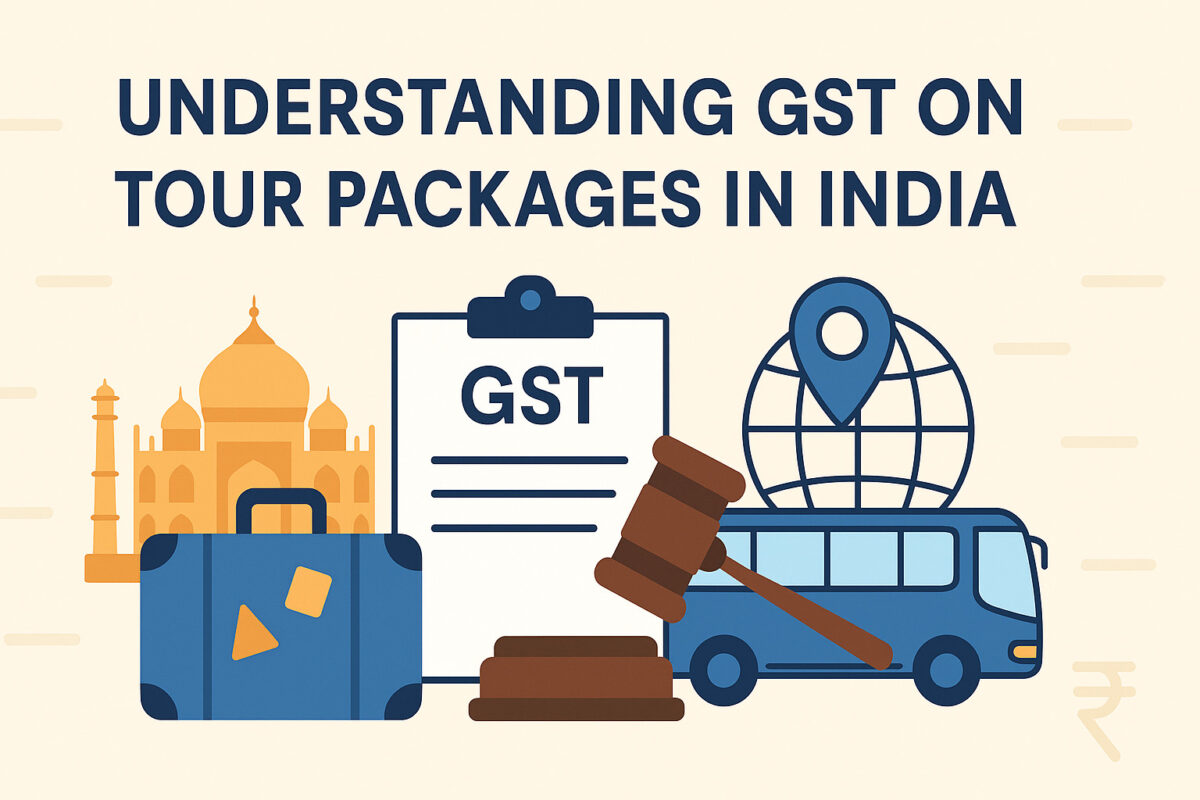Understanding GST on Tour Packages in India

India’s travel and tourism industry has witnessed significant growth in recent years, driven by increasing disposable incomes, improved infrastructure, and a surge in domestic and international travel. As the industry expands, so does the need for regulatory clarity, particularly when it comes to taxation. One crucial area that often confuses travel operators and customers alike is the application of Goods and Services Tax (GST) on tour packages.
This article aims to simplify how GST on tour packages applies, explain the applicable tax rates and HSN codes, and highlight how travel agents and tour operators can remain compliant with GST regulations.
What is a Tour Package under GST?
Under the GST regime, a tour package typically refers to a bundled offering of travel-related services. These can include transportation (air, rail, or road), accommodation, sightseeing, meals, and sometimes visa assistance or travel insurance. The key aspect is that these services are offered as a composite supply, meaning they are provided together as a single package for a lump sum price.
The GST on tour packages depends on the nature of the supply—whether it’s a domestic tour or an international one—and where the services are consumed. For travel businesses, understanding this classification is essential for applying the correct GST rate and fulfilling compliance obligations.
Applicable GST Rates on Tour Packages
The GST rates on tour packages depend on the type of services included and the nature of the package. Here is a simplified breakdown:
- Domestic Tour Packages: Generally taxed at 5% GST without Input Tax Credit (ITC) or 18% GST with ITC, depending on how the package is structured and billed.
- International Tour Packages: Considered as export of services when billed in convertible foreign exchange and may be zero-rated under certain conditions.
For example, if a tour operator sells a package including hotel stay and local transport for a domestic trip, the service is typically taxed at 5% GST without ITC. However, if the operator opts to claim ITC on inputs like hotel bookings, the 18% rate applies.
Understanding the GST on Tour Packages structure helps travel businesses choose the correct taxation path based on profitability and compliance ease.
HSN Codes Relevant to Tour and Travel Services
HSN (Harmonized System of Nomenclature) codes are crucial for classifying services and goods under GST. For tour operators and travel agents, the following HSN code is generally applicable:
- 9985 – Travel arrangement and tour operator services
This code encompasses activities like arranging tours, bookings, and bundled travel packages. Mentioning the correct HSN code while invoicing ensures smooth GST return filing and helps avoid classification issues during audits.
GST Registration & Compliance for Travel Businesses
Any travel agent or tour operator with an annual turnover exceeding the threshold limit (currently Rs. 20 lakhs for most states and Rs. 10 lakhs for special category states) must register under GST. Key compliance requirements include:
- Timely filing of GST returns (monthly or quarterly based on scheme opted)
- Issuance of proper tax invoices
- Correct HSN code usage
- Maintenance of records for audit purposes
Failure to comply can result in penalties, interest charges, and potential legal action.
Input Tax Credit (ITC) for Tour Operators
Tour operators can claim Input Tax Credit on eligible business expenses—like booking hotels, transport vehicles, or vendor commissions—only if they opt for the 18% GST rate. If they go for the 5% concessional rate, ITC is not allowed.
Therefore, travel businesses must perform a cost-benefit analysis to decide which rate structure is more advantageous based on their business model.
Common Challenges and Mistakes
- Incorrect Classification: Misidentifying the supply type—composite vs. mixed—leads to wrong GST application.
- Improper HSN Usage: Using incorrect HSN codes affects return filings and audit readiness.
- Invoice Errors: Missing or incorrect details on tax invoices can lead to ITC denials or penalties.
- Lack of Documentation: Inadequate records of bookings and expenses make it hard to justify GST claims.
Role of Chartered Accountants in GST Compliance
Navigating the GST framework for tour packages can be complex, especially for businesses that offer customized or hybrid travel solutions. A Chartered Accountant (CA) helps in:
- Determining the correct GST rate and HSN code
- Structuring invoices to maximize ITC
- Filing returns accurately and on time
- Advising on export compliance for international packages
Engaging a CA ensures businesses stay compliant, avoid legal pitfalls, and optimize their tax positions.
Conclusion
Understanding the GST on tour packages is essential for every travel business in India. From selecting the correct GST rate to ensuring proper HSN classification and ITC claims, compliance requires careful attention to detail. With proper guidance and accounting support, travel agencies and tour operators can simplify their GST journey and focus more on delivering seamless travel experiences.
For professional assistance with GST compliance, invoicing, and financial planning tailored to your travel business, consult with our experienced Chartered Accountants today.






